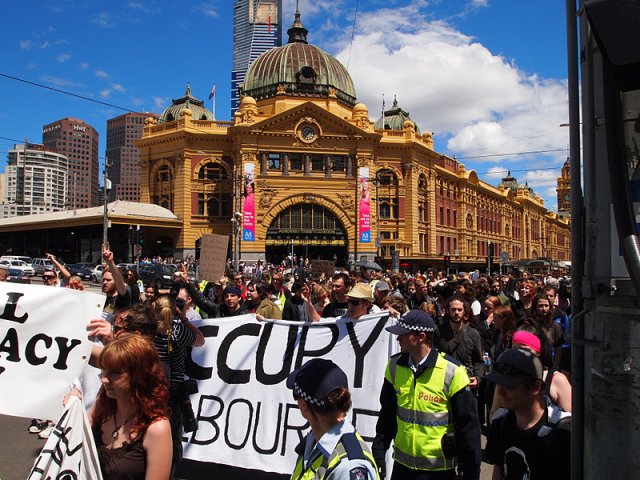
Despite the police brutality faced by Occupy Melbourne protesters just over a week before during their eviction from City Square, Occupy Melbourne returned to the streets on October 29.
About 500 occupiers assembled at the State Library with the same anti-corporate message and a louder voice.
After the meeting at the State Library, there was a march to Treasury Gardens where the general assembly (GA) was held. During the march, the numbers swelled to 1000 or more.
A consensus vote at the GA decided that Treasury was not a suitable place to hold the occupation given the large number of police and the threat to arrest anyone attempting to erect structure. Another proposal, to occupy Edinburgh Gardens in North Fitzroy got little support because it is a 40 minute tram trip from the city, well away from the political/economic centre of Melbourne.
It was decided to occupy Bowens Lane, just inside RMIT City Campus.
Word was given by police that the City of Melbourne Council had instructed them to remove any tents or permanent structures erected anywhere within it’s jurisdiction. Not only that, but the council also issued warning that anyone who resisted police taking down these structures would be arrested for obstructing police.
These factors contributed to the decision made at the GA that Treasury was an unviable alternative and other options should be assessed. Bowens Place was decided on.
Police presence was again heavy and intimidation tactics were again obvious to attendees, however that didn’t halt the occupation from gaining more momentum, and members of the 99% demanding direct democracy.
The march from Treasury to Bowens Place was again under the watchful eye of police. However, there was no violence.

The uniformed presence increased as protesters assembled at RMIT, and the attitude remained festive. However RMIT management didn’t waste any time in issuing notice to the crowd that they were trespassing on privately owned property; as hypocritical as that is for a public university.
The GA decided on the State Library as the next site of the occupation, and further discussion is scheduled on the matter for the next assembly at 4 PM on October 30.
If the movement continues in the same way as it has been for the past two weeks, despite the police violence and harassment, we could see the emergence of a sustained movement in Melbourne seeking to make the interests of the 99% heard.
Comments
Anonymous replied on Permalink
Anonymous replied on Permalink
Anonymous replied on Permalink
Anonymous replied on Permalink
Anonymous replied on Permalink
Anonymous replied on Permalink